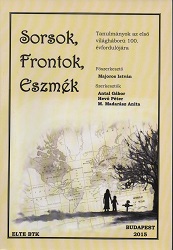„Mit ér a szavazati jog, ha elvész az ország ahol szavazhatunk?” A brit nők és a munka világa, 1914-1918
"What good is the right to vote, if it is lost in the country where you vote for?"British Women and the World of the Work, 1914-1918
Author(s): Anita M. Madarász
Subject(s): Political history, Social history, Gender history, 19th Century, Pre-WW I & WW I (1900 -1919)
Published by: Eötvös Loránd Tudományegyetem, Új-és Jelenkori Egyetemes Történeti Tanszék
Keywords: NUWSS; WSPU; Home Front; DORA; manpower shortage; compulsory military service; wartime woman worker; job opportunities for women; economic hardship; electoral inequality;
Summary/Abstract: From the beginning of the call for the first petition in 1866 until 1914 the lesser or greater groups were unable presenting considerable results. The government regarded the potential consequences – sometimes mentioned extremely ridiculous exceptions - and the members declined the suffrage for women until 1918. The breaking out of the First World War (or Great War) and the events of the four years following it contributed the fact that changing in the women’s social role and their political role should occur: the roles were changed, there was a need for the women and their work. It was necessary to say thanks to them for their vague work made in the course of four years and their voluntary willingnesses to make sacrifice somehow. So, the government granted the franchise, the opportunity that the women should be allowed to interfere in the establishment of the country’s politics among other things.
Book: Sorsok, frontok, eszmék. Tanulmányok az első világháború 100. évfordulójára
- Page Range: 577-590
- Page Count: 14
- Publication Year: 2015
- Language: Hungarian
- Content File-PDF

